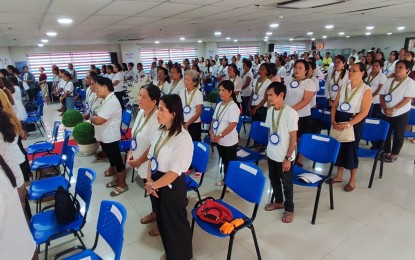
IMPROVED CONDITION. Pantawid Pamilyang Pilipino Program (4Ps) beneficiaries during a graduation ceremony in Ormoc City in this June 21, 2023 photo. At least 21,432 families have graduated from the 4Ps from 2021 to mid-2023 in Eastern Visayas region, citing improvements in their well-being, the Department of Social Welfare and Development (DSWD) reported on Wednesday (July 5, 2023). (Photo courtesy of DSWD)
TACLOBAN CITY – At least 21,432 families in Eastern Visayas have graduated from the Pantawid Pamilyang Pilipino Program (4Ps) from 2021 to mid-2023, citing improvements in their well-being, the Department of Social Welfare and Development (DSWD) reported on Wednesday.
The DSWD regional office found the status of these families who used to receive regular cash aid from the national government through the social welfare and development indicators (SWDI) tool, said Leslie Ruiz, 4Ps regional monitoring and evaluation officer.
SWDI is a set of conditions and situations and resource utilization that enables a family to function adequately and make full use of opportunities available in the community to improve their situation or resolve problems.
“Households that are ready to graduate from the program are guaranteed to have a transition plan, which includes the commitments of partner stakeholders to follow up and ensure that the exiting households remain self-sufficient regardless of challenges in their individual lives,” Ruiz said in an interview.
The DSWD has turned over all graduating households to the city and municipal governments for aftercare programs and services in partnership with national government agencies, national government organizations, civil society organizations, and private sector.
From 2021 to June 2023, some 8,769 programs and services have been provided to graduated households such as financial assistance during crisis, livelihood grants, employment facilitation, nutrition improvement, scholarship, education, medical, micro credit, legal services, and others.
All graduates joined "Pugay Tagumpay" graduation, a celebration to formally introduce to the public their success stories.
Of the 21,432 graduates in the entire region, 10,616 are from Leyte province, 3,107 from Southern Leyte, 3,751 from Northern Samar, 2,609 from Samar, 707 from Eastern Samar, and 642 from Biliran.
One of the graduates is the family of Jenecile Parambita, who passed the 2022 licensure examination for social work. This year, she joined the DSWD workforce as 4Ps city link assigned in Ormoc City.
Last year, Parambita topped her class and graduated magna cum laude at Leyte Normal University. Her academic and socio-civic involvements and engagements led her to be hailed as top 10 model students of LNU for three consecutive school years.
“There is nothing impossible for a child and a family that hopes and strives for a future free from the ties that bind generational poverty. As a 4Ps child then, it is a true honor to serve as a DSWD employee today,” Parambita told reporters.
Also known as conditional cash transfer, 4Ps is an investment in the human capital of the national government that provides conditional cash grants to the poorest of the poor, to improve the health, nutrition, and education of children aged 0-18 years.
The program aims to break the cycle of poverty by keeping children aged 0-18 healthy and in school so they can have a better future.
Households receive cash grants if children stay in school, get regular health checkups, monitor their growth, and receive vaccines. Pregnant women must get pre-natal care, with their births attended to by professional health workers.
Parents or guardians are required to participate in monthly community-based family development sessions to learn about positive child discipline, disaster preparedness, and women’s rights. (with reports from Jesica A. Lentejas, OJTs/PNA)
